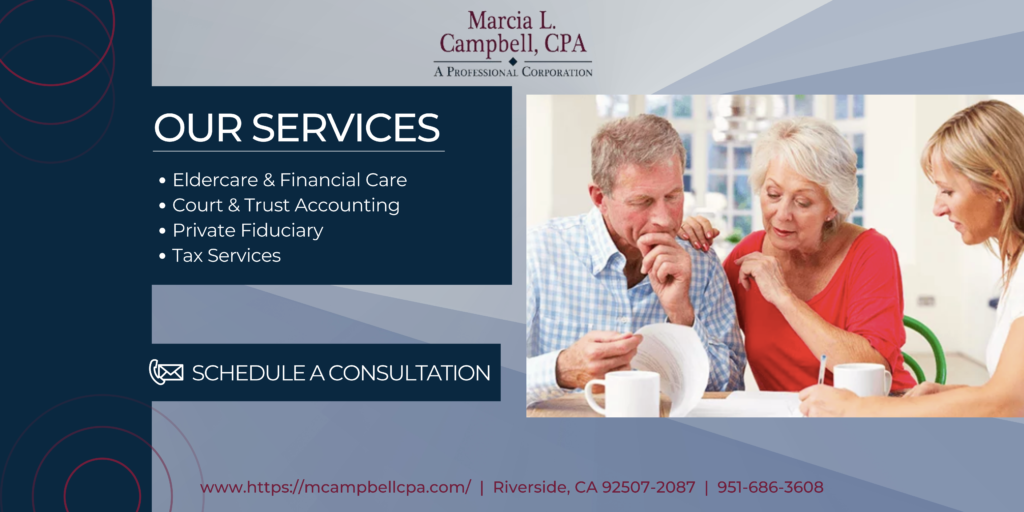
At Marcia L. Campbell CPA, we have decades of experience serving as professional trustees and assisting trustees with our premier professional fiduciary services! With us, you can rest assured that your trust will always be managed and administered by the law and trust instructions, and that the integrity of the trust will always be upheld for beneficiaries.
What is a Fiduciary Duty?
Any time someone receives the legal authority to manage a person’s assets and finances and make decisions on their behalf, they become a fiduciary.
Fiduciaries automatically accept legal responsibility to manage trust assets in the best interests of beneficiaries and according to the trust document. This legal obligation is their fiduciary duty, and it offers crucial protections for beneficiaries. This duty includes:
- The duty of care: The responsibility to be as informed as possible and use sound judgment to protect the interests of the trust and beneficiaries.
- The duty of loyalty: The responsibility to always act in the best interest of all beneficiaries at all times and avoid a conflict of interest whenever possible.
- The duty of good faith: The responsibility to always act within the law to advance the interests of all beneficiaries and the trust.
- The duty of confidentiality: The responsibility to maintain confidentiality of all information relating to the beneficiaries.
- The duty of impartiality: The responsibility to treat all beneficiaries fairly when administering the trust, from communications to distributions.
- The duty of prudence: The responsibility to administer matters and make decisions concerning the interests of beneficiaries and the trust with the highest degree of professional skill, caution, and critical awareness of risk, even if you have no experience in the field. For example, if trust assets must be invested to keep the trust profitable, this must be done with the acumen of a professional investor.
- The duty to make the trust productive: The responsibility to make the assets within the trust productive for beneficiaries.
- The duty to disclose and communicate: The responsibility to be transparent and disclose any and all relevant information regarding how the trustee role is being performed. This duty also refers to maintaining reasonable and consistent lines of communications with beneficiaries.
- The duty to prepare a trust accounting: The responsibility to prepare a trust accounting annually that serves as a financial statement of all financial transactions related to the trust over the course of a year and that satisfies specific criteria. This information should be available at all times because beneficiaries have the right to request it whenever they wish to by a reasonable deadline.
This list just scratches the surface of trustee responsibilities. Trustees also must file taxes for the trust, make distributions, and maintain a comprehensive record of all transactions. Failure to fulfill these obligations has legal and financial repercussions on the trustee.
Related Article: The Benefits of Hiring a Private Fiduciary
Why Do You Need a Professional to Uphold the Fiduciary Duty?
One of the most important reasons to hire a professional fiduciary is that breaching your fiduciary duty can have severe financial and legal consequences.
A lack of training, experience, or knowledge about your role is not an excuse, and you are under the gun the moment you take on this role. If you do not answer a resounding yes to these questions, working with a professional should be non-negotiable:
- Do you have substantial financial experience on par with a professional CPA?
- Do you have a deep understanding of the California Probate Code and the fiduciary duties you must uphold?
- Do you have the legal expertise to interpret the complex language in the trust document per California Probate Law to ensure you are administering the trust legally and satisfying the wishes of the individual who created the trust?
Even if you understand your responsibilities, interpreting the complex language in the trust document and the California Probate Code that governs it requires extensive expertise and experience. Simply being adept at finances is not enough.
The margin of error is slim. One mistake or misunderstanding can result in expensive, lengthy, and draining litigation, with you potentially being legally or financially liable for damages and penalties. In some instances, you could even lose your right to receive payment for your efforts.
You will also need to have considerable financial expertise. From preparing and balancing a comprehensive trust accounting to filing taxes for the trust to overseeing investments and real estate held by the trust, this is not a role one can take on alone without such experience.
Even if you do not want a professional fiduciary to oversee the entire trust, hiring one to provide guidance, specific financial service, or serve as a co-trustee should be the bare minimum to prevent substantial damage to the trust, your reputation, and your relationship with beneficiaries.
“Clients come to me all the time after being selected to serve as the trustee. Usually, they are honored but have little to no idea what managing and administering the trust entails. They are always blown away by the scope of this responsibility. The average person doesn’t have the knowledge, experience, or skills required to perform the balancing act of upholding their fiduciary duty, abide by the California Probate Code, and interpret and adhere to the complex language in the trust. Failure to do all three can have irreversible, devastating consequences for everyone involved.”
– Marcia L. Campbell, CPA & Professional Trustee
Related Article: Benefits of a Professional Trustee
Do You Want to Ensure a Trust is Managed Expertly? Contact Us to Work with a Professional Trustee Who Always Fulfills Their Fiduciary Duty!
As a trustee, fulfilling your fiduciary duty is not an option—it is your legal responsibility. To balance this obligation with an extensive knowledge of the law and financial acumen requires the help of a professional fiduciary! Hiring a professional is more than just bringing on a helping hand; it is protecting yourself and safeguarding the family legacy you have been enlisted to protect. Whether you need guidance or professional trust accounting assistance, we can help.
With our professional trustee services, you can rest assured that we will always fulfill our fiduciary duty, abide by California Probate Law, and follow the terms in the trust document. Schedule a consultation to get premier professional trustee services.


